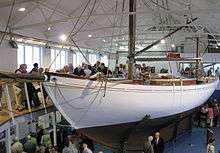Asgard (yacht)

Asgard is a 51-foot (16 m) gaff rigged yacht. She was owned by the English-born writer and Irish nationalist Erskine Childers and his wife Molly Childers.[1][2] She is most noted for her use in the Howth gun-running of 1914.
Asgard is sometimes mistaken for Dulcibella, the boat in Robert Erskine Childers's classic novel The Riddle of the Sands.[3] This was based on a smaller vessel, Vixen, previously owned by Childers.[4][5]
Design and early use
Asgard was bought for £1,000 in 1904 (£84,000 in 2006) from one of Norway's most famous boat designers, Colin Archer.[6] The interior was custom built to the specifications of Childers and his wife Molly. Molly, disabled following a childhood accident, sometimes took the helm of Asgard, strapped onto the deck with harnesses so she could navigate the rough waters of the Irish Sea.[7]
Asgard's most famous trip was the Howth gun-running in 1914. Childers, his wife and a small crew, made the channel crossing with a hold full of rifles from Germany into Howth harbour just north of Dublin, to arm the Irish Volunteers in response to the arming of the Ulster Volunteers by the Larne gun-running in April.[2] There is a plaque on dock wall in Howth as a memorial to this historic boat journey.[8]
Shortly after the Easter Rising, Asgard was put into long-term dry-dock in Northern Wales, where she was sold in 1928.[1] In 1968 the government formed the committee known as Coiste an Asgard and placed Asgard under their guidance and control to be used as a sail training vessel for the young people of Ireland. Sail training cruises were carried out on Asgard each year from 1969 to 1974.
Restoration and display


In 1961, the Irish Government procured the ageing vessel and returned her to Howth on 30 July 1961 in a re-enactment of the 1914 landing, using some of the original rifles and surviving members of the Irish Volunteers.[1][9] It was used for sail training until 1974, when it was dry-docked and installed inside Kilmainham Gaol in Dublin where it remained as a museum attraction, until 2001.[10]
In 2007 new restoration work began.[11] It focussed on preserving as much as possible of the original wooden hull and its metal supports, before replacing pieces with new material.[11][12] In a project led by master shipwright John Kearon, over 70% of the original deck and hull were preserved.
Since August, 2012 the restored Asgard is on permanent display in Collins Barracks, Dublin. The yacht and related artifacts are now on permanent display in an exhibition titled ' Asgard: The 1914 Howth Gun Running Vessel Conserved'.[13] Nessa Childers MEP and her brother Prof. Rory Childers were the guests of honour at the official opening by Arts Minister Jimmy Deenihan.[14]
See also
References
- Notes
- 1 2 3 Robert Erskine Childers, Private Papers (Trinity College Library, Dublin)
- 1 2 Ring (1996), pps. 95-99.
- ↑ Boyle (1977), pps. 108-119.
- ↑ Dulcibella and the Riddle of the Sands
- ↑ Buchan, Alastair (January 2006). "Coastal Cruising - Riddle in the Sands". Cruising World. 32 (1): 87. ISSN 0098-3519. Retrieved 11 Aug 2012.
- ↑ Colin Archer Gjenværende Skøyter Archived 11 February 2009 at the Wayback Machine.
- ↑ Boyle (1977), pps. 185-196.
- ↑ "Asgard Memorial, Howth, County Dublin". Archived from the original on 10 October 2007.
- ↑ Correspondent (31 July 1961). "Irish reenact gun running expoit. Yacht carrying 1914 rifles sails in.". The Times. p. 12.
- ↑ Asgard takes to the air on way back to sea
- 1 2 "Restoring Ireland's Most Historic Vessel". Seascapes News Summary - 10th December 2007. RTÉ. 2007-12-10. Retrieved 2008-06-07.
- ↑ Restoring Ireland's Most Historic Boat Archived 18 December 2007 at the Wayback Machine.
- ↑ O'Halloran, Marie (9 August 2012). "Asgard docks at Collins Barracks". The Irish Times. Retrieved 9 August 2012.
- ↑ Gibbons, James (11 August 2012). "A tour de force at the Military Archives". The Irish Times. Retrieved 11 August 2012.
- Sources
- Ring, Jim (1996). Erskine Childers: A Biography. London: John Murray. ISBN 0-7195-5681-3.
- Boyle, Andrew (1977). The Riddle Of Erskine Childers. London: Hutchinson. ISBN 0-09-128490-2.